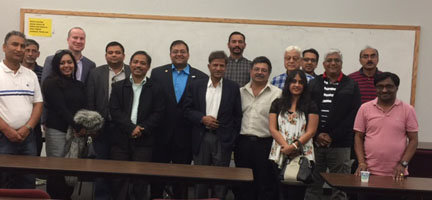 SILICON VALLEY, CA: On Sunday 15th October, the Foundation for India and Indian Diaspora Studies (FIIDS-USA), a think tank for policy analysis, awareness and advocacy for India and Indian Diaspora related issues, hosted a talk and discussion with Ambassador Virendra Gupta on “India’s Security Challenges”.
SILICON VALLEY, CA: On Sunday 15th October, the Foundation for India and Indian Diaspora Studies (FIIDS-USA), a think tank for policy analysis, awareness and advocacy for India and Indian Diaspora related issues, hosted a talk and discussion with Ambassador Virendra Gupta on “India’s Security Challenges”.
Ambassador Gupta, who has been director general of Institute of Defense and Security Analysis, New Delhi based India’s largest think tank on security studies, covered a wide range of security challenges mainly related to Pakistan, and China. During his engaging and informative talk, Ambassador Gupta stressed that Pakistan’s internal dynamics will continue to compel the Pakistan military and politicians to portray the India bogey.
Pakistan will continue to use nuclear threat, as a deterrent but will cause more damage with sponsoring on-going acts of terrorism. Despite repeated attempts to establish peace, India should prepare itself to tackle state- sponsored terrorism. Ambassador Gupta demanded a multifold increase in investments in intelligence to counter terrorism.
Ambassador Gupta used the recent Dokalam standoff to articulate current security challenges posed by China. He emphasized that today’s India is far different than 1962’s India both militarily and politically, especially with new government under the leadership of Prime Minister Narendra Modi. From his discussions with serving as well as recently retired military and civil personnel, he shared his observation that India is ready to tackle China’s military threat. However, he noted that 1962 had a great impact on India’s population and media who were projecting unwarranted defeatist views during the Doklam conflict.
He mentioned that PM Narendra Modi and National Security Advisor handled the Doklam situation very well. He dismantled the argument of bilateral trade from defeatist folks saying the trade volume is neither significant to China nor is the asymmetrical unbalanced trade in India’s favor Rather India’s industry is getting adversely impacted and this trade will cause security challenges if border escalations happen.
Ambassador Gupta, who is also president of Antar Rashtriya Sahayog Parishad (ARSP), a platform for Indian Diaspora, advised taking a much more sympathetic and understanding view with sensitivity while dealing with Nepal and Bangladesh who share long borders with India.
The talk was followed by a very engaging discussion with attendees, mainly activists, policy researchers, community leaders and elected officials. Fremont City Councilmember Raj Salwan also attended the talk and emphasized on India’s need of cooperation and alignment with US, Israel and Japan.
India Post News Service






